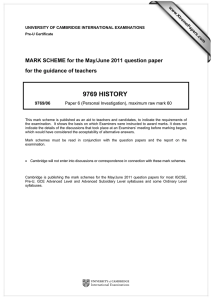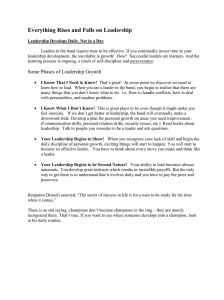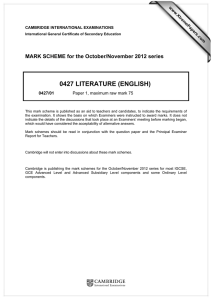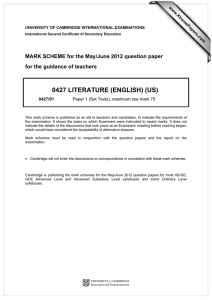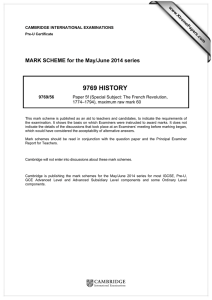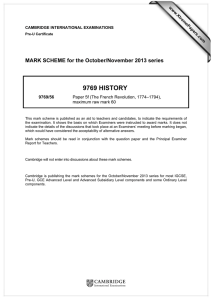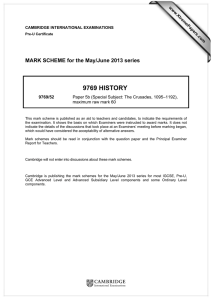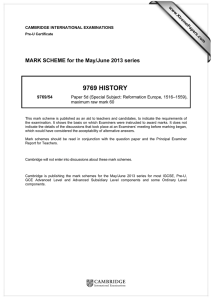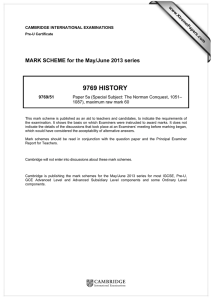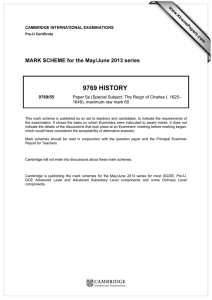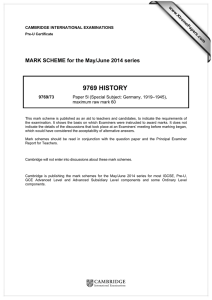9769 HISTORY MARK SCHEME for the May/June 2013 series
advertisement
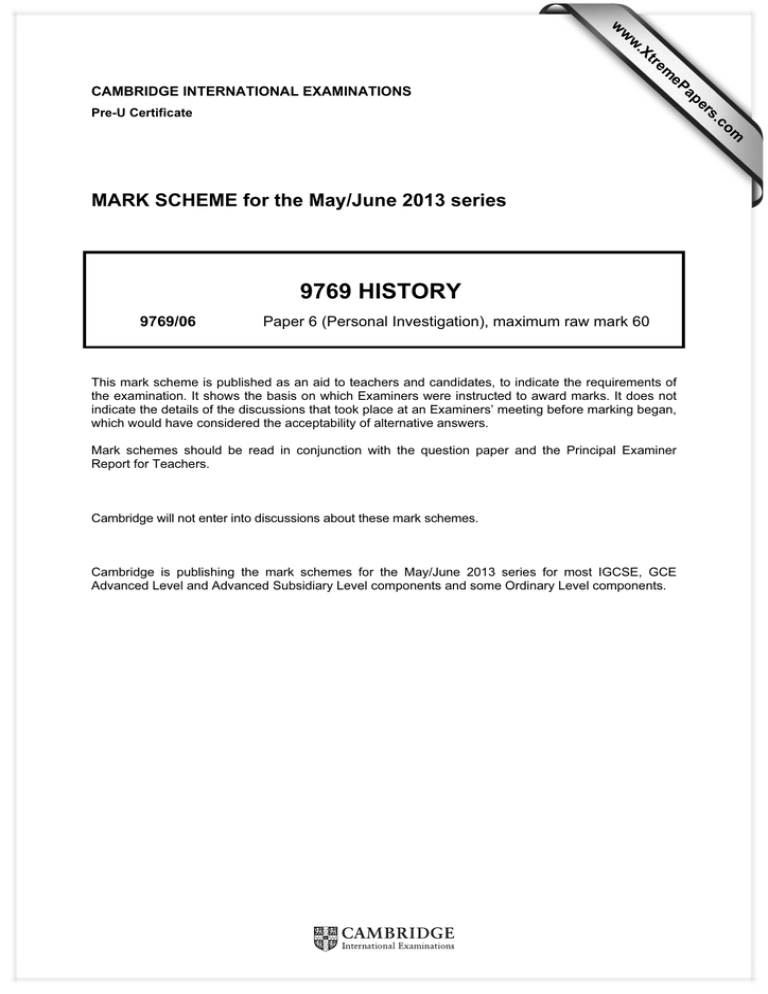
w w ap eP m e tr .X w CAMBRIDGE INTERNATIONAL EXAMINATIONS s er om .c Pre-U Certificate MARK SCHEME for the May/June 2013 series 9769 HISTORY 9769/06 Paper 6 (Personal Investigation), maximum raw mark 60 This mark scheme is published as an aid to teachers and candidates, to indicate the requirements of the examination. It shows the basis on which Examiners were instructed to award marks. It does not indicate the details of the discussions that took place at an Examiners’ meeting before marking began, which would have considered the acceptability of alternative answers. Mark schemes should be read in conjunction with the question paper and the Principal Examiner Report for Teachers. Cambridge will not enter into discussions about these mark schemes. Cambridge is publishing the mark schemes for the May/June 2013 series for most IGCSE, GCE Advanced Level and Advanced Subsidiary Level components and some Ordinary Level components. Page 2 Mark Scheme Pre-U – May/June 2013 Syllabus 9769 Paper 06 Personal Investigation These banding definitions address Assessment Objectives 1, 2, 3 and 4. Introduction The banding definitions which follow reflect and must be interpreted within the context of the following general statement: Examiners should give their highest marks to candidates who show a ready understanding of the relevant material and a disciplined management of the discussion the question provokes. They should be impressed more by critical judgement, careful discrimination and imaginative handling than by a weight of facts. Credit should be given for evidence of a good historical intelligence and for good use of perhaps unremarkable material. The Band in which an essay is placed depends on a range of criteria. As a result, not all Investigations fall obviously into one particular Band. In such cases a ‘best-fit’ approach should be adopted with any doubt erring on the side of generosity. In marking an Investigation, examiners should first place it in a Band and then fine-tune the mark in terms of how strongly/weakly the demands of the Band have been demonstrated. Since the Investigation is a reflective piece of work and not written under time restraints, greater emphasis than in other components of the examination is placed upon such matters as the use of a wide range of sources, the demonstration of a critical sense, high standards of presentation and use of English. Band 1: 49–60 Whilst not being perfect the answer will be the best that a candidate can be expected to achieve at this level. The answer will be strongly argued and sharply analytical in approach. It will show that the demands of the question have been fully understood and that a conscious and sustained attempt has been made to respond to them in appropriate range and depth. It will be coherent and structured with a clear sense of direction. The focus will be sharp and persistent. Some lack of balance, in that certain aspects are covered less fully or particular arguments deployed less strongly than others, need not preclude a mark in this Band. The material will be wide-ranging and handled with the utmost confidence and a high degree of maturity. Historical explanations will be invariably clear, sharp and well developed and historical concepts fully understood. Candidates at this level may well demonstrate a sophisticated awareness of links and comparisons to other countries and periods. The answer will make use of a wide range of sources. These will normally be largely secondary but some acquaintance with primary sources is to be expected at this level. Sources and historical interpretations will be treated critically and there should be a good grasp of formal critical evaluation with reference to such issues as provenance, dating and context, corroboration and difference, utility and reliability. Critical sense and critical evaluation can be applied to sources and/or interpretations. Where formal critical evaluation is not demonstrated, but where the answer is strong in all or most of the criteria relevant to this Band, the paucity or lack of this element should not prevent it being placed in this Band. English will be clear and fluent with excellent vocabulary. © Cambridge International Examinations 2013 Page 3 Mark Scheme Pre-U – May/June 2013 Syllabus 9769 Paper 06 Band 2: 37–48 The answer will be characterised by a markedly analytical and argued approach, although there may be occasional passages which do not go beyond description or narrative. It will show that the demands of the question have been very well understood and that a determined attempt has been made to respond to them in appropriate range and depth. The work will be coherent and well-structured and its judgements will be effectively supported by accurate and relevant material. Some lack of rigour in the argument and occasional blurred focus may be allowed. The material will be fully understood, confidently deployed and well controlled. Historical explanations will be clear and well developed and there will be a sound understanding of historical concepts and vocabulary. Candidates may demonstrate an awareness of links and comparisons to other countries and periods. The answer will make use of a good range of sources. These will probably be largely or entirely secondary, although some acquaintance with primary sources may be expected. Sources and historical interpretations will be treated critically and there should be some attempt at formal critical evaluation but at a lower level, and with a more restricted range, than that indicated for Band 1. Critical sense and formal critical evaluation can be applied to sources and/or interpretations. Although a sound critical sense is normally to be expected at this level a lack of formal critical evaluation should not preclude the award of a mark in this Band. Use of English will be highly competent, clear, generally fluent and very largely error-free. Band 3: 25–36 The answer will attempt an analytical approach, although there will be passages which do not go beyond description or narrative. It will show that the demands of the question have been understood, at least in large part, and that a conscious attempt has been made to respond to them. There will be an effective focus on the terms of the question and, although in places this may break down, standards of relevance will be generally high. Although it may not be sustained throughout the answer, or always fully supported, there will be a sound sense of argument. The material will be clearly understood and organisation very competent. There will be a conscious attempt to draw conclusions and form judgements and these will be adequately supported. Candidates may demonstrate some awareness of links and comparisons to other countries and periods. The answer will make use of a fair range of sources, although these are likely to be confined to secondary sources. Some critical sense in dealing with sources and interpretations is to be expected, although this may well be limited or undeveloped, especially in the lower range of the Band. Formal critical evaluation as detailed in Bands 1 and 2 is, again, likely to be limited or may not appear at all, although there may be attempts at cross-referencing. Historical explanations and the use of historical concepts and vocabulary will be generally sound but some lack of understanding is to be expected. Use of English will be very competent, clear and very largely free of serious errors. Band 4: 13–24 The answer may contain some analysis but descriptive or narrative material will predominate. The essay will show that the demands of the question have been understood at least in good part, and that some attempt has been made to respond to them. It will be generally coherent with a fair sense of organisation. Focus on the exact terms of the question is likely to be uneven and there will be a measure of irrelevance. There will be some inaccuracies in knowledge, and the range may well be limited with some gaps. Understanding of the material will be generally sound although there will be some lack of tautness and precision. Explanations will be generally clear although not always convincing or well developed. Some attempt at argument is to be expected but it will lack sufficient support in places and sense of direction may not always be clear. Critical sense will be limited. Candidates may attempt to show an awareness of links and comparisons to other countries and periods. There may be some awareness of differing interpretations and some attempt at evaluating sources and interpretations but this is not generally to be expected at this level and such skills, where deployed, will be unsophisticated. Some errors of English may be present but written style should be clear although lacking in real fluency. © Cambridge International Examinations 2013 Page 4 Mark Scheme Pre-U – May/June 2013 Syllabus 9769 Paper 06 Band 5: 0–12 The answers will respond in some measure to the demands of the question but will be very limited in meeting these. Analysis, if it appears at all, will be brief and undeveloped. Uncritical narrative will predominate. If an argument is attempted, it will be lacking in real coherence, sense of direction, support and rigour. Focus on the exact terms of the question is likely to be very uneven; unsupported generalisations, vagueness and irrelevance are all likely to be on show. Historical knowledge, concepts and vocabulary will be insufficiently understood and there will be inaccuracies. Explanations may be attempted but will be halting and unclear. Where judgements are made they will be largely unsubstantiated whilst investigation of historical problems will be very elementary. Critical sense will be very limited whilst awareness of differing interpretations and the evaluation of sources is not to be expected. Candidates are unlikely to demonstrate an awareness of links and comparisons to other countries and periods. The answer may well be fragmentary and slight. Significant errors of spelling, grammar, punctuation and syntax may well hamper a proper understanding of the script. © Cambridge International Examinations 2013
